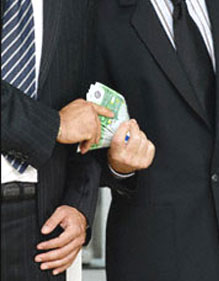|
Getting your Trinity Audio player ready...
|
 Dear Corruption Watch,
Dear Corruption Watch,
I recently came across a report damning our lack of compliance with the OECD Anti-Bribery Convention that South Africa ratified in 2007. It says out of a mere ten foreign bribery allegations that have come to light our government has prosecuted exactly zero. We have until October to write a self-assessment report. What is the OECD convention all about and what happens if we don’t comply with the report?
Embarrassed South Africa
Dear Embarrassed,
South Africa is indeed a party to the Organisation for Economic Co-operation and Development (OECD) Anti-Bribery Convention. As you have noted, South Africa became a party to the convention in 2007. This convention establishes legally binding standards to criminalise bribery of foreign public officials in international business transactions.
Under the OECD convention, parties are required to take measures to ensure that it is a criminal offence under their own laws for any person to offer a foreign public official any pecuniary or other advantage in order to obtain an improper benefit in international business. Parties to the convention are required to ensure that bribery of foreign public officials is punishable by effective, proportionate and dissuasive criminal sanctions.
South Africa has done this on paper. Section 5 of our Prevention and Combatting of Corrupt Activities Act makes it a criminal offence to offer or give any foreign public official, any gratification, in order to induce him or her to act in an illegal manner. Gratification includes but is not limited to money and gifts.
The convention establishes a monitoring mechanism to ensure that its obligations are carried out. Monitoring is done by the OECD Working Group on Bribery. Country monitoring reports and recommendations are prepared following country visits. The convention also creates a mechanism for extensive follow-up. In essence, the convention is designed to ensure that the fight against bribery is effective and aims to create a level playing field for fair competition between companies.
Since entering the enforcement phase of the convention, the working group’s feedback to South Africa has been consistent: take more proactive steps to detect, investigate and prosecute cases of bribery in international business deals. At present, we are listed among the countries that have little or no enforcement.
So what happens if we ignore the recommendations in the working group’s report?
If our implementation of the convention continues to be inadequate, the working group will scrutinise us further, conduct more on-site visits and ultimately, name and shame us in front of our international peers. But our reputation is not the only thing we should be concerned about.
As you correctly point out, the working group’s report found that only ten foreign bribery allegations have surfaced since we became a party to the convention in 2007. This is despite South Africa’s economic links to a number of countries with corruption risks. The extremely low number of foreign bribery allegations raises concerns about whether we feel comfortable speaking out about bribery and corruption.
In this vein, the working group report recommends that South Africa urgently takes concrete and meaningful steps to ensure that those who report suspected acts of foreign bribery are, in practice, afforded the protections guaranteed by the law.
This recommendation comes at an opportune time, as the long-awaited Protected Disclosures Amendment Bill has been tabled for comment. The bill significantly expands whistle-blower protection. We now need the political will to implement it and an enabling environment to support it. While worrying about the working group report and South Africa’s lack of enforcement, let us also worry about encouraging and protecting those who speak out.
• This article was first published in Sunday Times: Business Times



